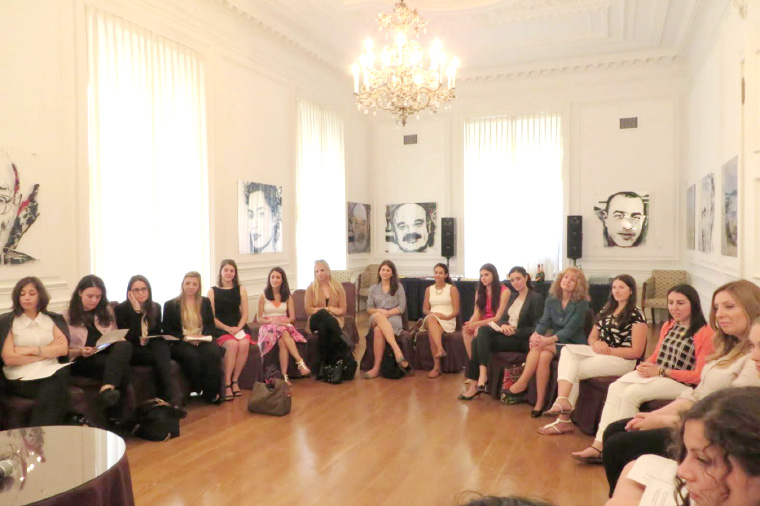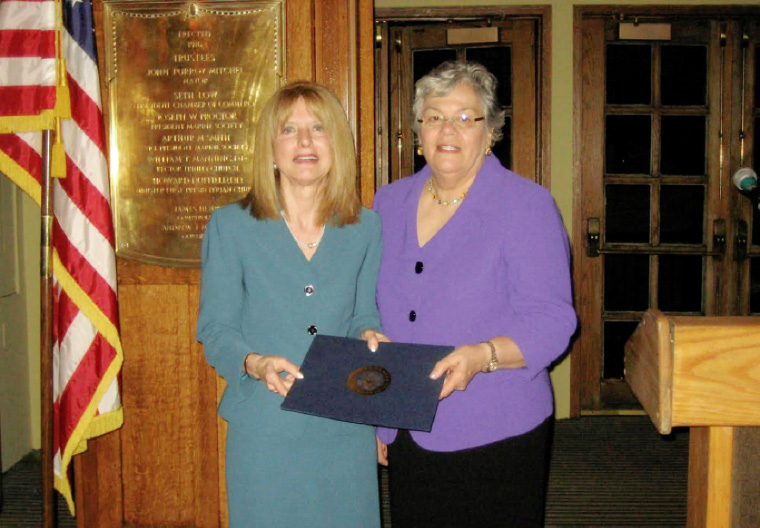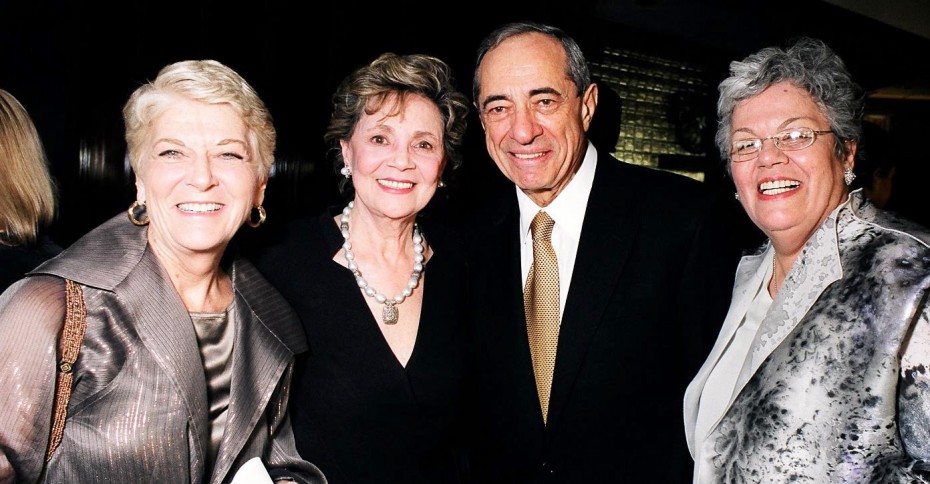Celebrations for the 35th anniversary of the National Organization of Italian American Women (NOIAW) kicked off October 26 in New York City. A “unique sisterhood that welcomes women of all ages and phases of life,” NOIAW was founded in 1980 by a group of Italian American women who wanted to establish a national network to support women of Italian heritage in their educational and professional goals. Today, NOIAW continues to support its 500 members – and counting – nationwide through social and educational programs, while celebrating the Italian heritage. L’Italo-Americano has spoken to Aileen Riotto Sirey, founder and Chair Emerita, and Maria Tamburri, Chair of the National Board, to learn more about the organization’s history, variety of interesting programs and plans for the future.
Aileen, why did you decide to start this organization?
As I began working with patients in psychotherapy in the late ‘70s, I became curious as to how the common history and culture of an ethnic group affected our values and personality. Isolated from women of Italian ancestry, I sought information about Italian American women groups from the newly elected congresswoman Geraldine Ferraro. She indicated there were no such groups and urged me to start one. I agreed and Geraldine invited a small group to my home. After two meetings, the group decided to start the National Organization of Italian American Women on July 14, 1980. Our name was the suggestion of Matilda Raffa Cuomo, former first lady of New York State and one of our founding Distinguished Board Members. I became the first President for seven years and served as Chairwoman for 25 years.

Current and past participants in NOIAW’s annual Cultural Exchange program meet Ambassador of Italy to the United States, Claudio Bisogniero, and Consul General Natalia Quintavalle for a roundtable discussion at the Italian Consulate in New York City
Maria, why did you decide to get involved in this organization and how did you progress to become the current chair?
In 2006, my husband and I relocated to New York when he accepted a position as Dean of the John D. Calandra Italian American Institute. I became involved with NOIAW when I started attending various events, became a member, and then was elected to the board in 2007. I was impressed with the mission and history of the organization. I became more involved when I co-chaired the first Cultural Exchange Program, which was a collaboration with the Italian Ministry of Foreign Affairs (MAE). Italian and Italian American college women were given the opportunity to visit each other’s country for an educational and cultural experience. This popular program continues to this day, and in summer 2016 we will be sending a group of Italian American college women to Rome.
In 2008 I became the Executive Director of NOIAW, a position I held until 2011. In 2012, I assumed a volunteer role to support the board and oversee human resources, financial reporting, and other management activities. I became active again on the board and assumed the role of President in 2014 until becoming Chair of the National Board in June 2015.

Aileen Riotto Sirey, Ph.D., founder and Chair Emerita, Maria Tamburri, Chair of the National Board
One of the organization’s goals when it was founded was to change the stereotypes associated with Italian-American women. Do you feel that goal has been achieved and how? Do you feel there is still work to be done, even in general as it refers to the portrayal of Italian-Americans in the media? If so, how do you plan to address the issue?
Maria: The mission of our organization is to preserve Italian culture, history, and language. Through cultural programs and educational events, we promote the accomplishments of women of Italian ancestry in the workplace and community. We address these issues continually by promoting positive role models and by mentoring Italian American college women and young professionals. While there are more positive portrayals of Italian American men and women in the media, there are still some negative stereotypes that persist. We will continue to celebrate accomplished Italian American women to combat the lingering stereotypes.
This may be a difficult question because, reading about your organization, it feels like all your members are extraordinary women. But if you had to choose one NOIAW member who has particularly inspired you either in your personal or professional life (or both), who would that be and why?
Aileen: Through the years I have met many, many women of Italian ancestry who have broken barriers for women in the United States. It was an Italian American woman who became the first female governor in the United States (Ella Grasso); the first airline pilot for a major airline (Bonnie Tiburzi); the first female Speaker of the House of Representatives (Nancy Pelosi); and the first American Saint (Mother Cabrini). Janet Napolitano was first female Secretary of Homeland Security. The first national president of the powerful women’s organization NOW was Ellie Cutri Smeal. The most extraordinary woman I’ve known was Geraldine Ferraro. She was sincere in her convictions, committed to NOIAW, a spectacular role model for Italian American women and a loyal personal friend!
Maria: Yes, this is a difficult question because we have many women in our organization who have inspired us. First among many is Geraldine A. Ferraro, the first woman to become a vice presidential candidate on a major party ticket. We were fortunate to have her as a founding member who stayed involved with NOIAW until her death, serving as a member of our Distinguished Board.
In what ways has your Italian heritage influenced your life and career?
Maria: Although I am of mixed background, my Italian heritage has had a significant impact on me. My parents were hard-working, loving people who were positive role models with a tremendous work ethic. They challenged us to get an education and be the best we could be. I have no doubt that my success later in my career was a result of their example.
Your mentor program is a wonderful initiative. Can you describe it for our readers and give some examples of how it has helped young women to enhance their confidence and self-esteem as well as their careers?
Maria: Our mentors are outstanding role models who encourage the professional aspirations of our mentees. They help women who are just starting out to develop a strong professional network. One of our mentees went on to become an attorney, Treasurer of the NOIAW board, President of the Italian Welfare League and a board member of the National Italian American Foundation (NIAF). Our young members have been mentored in education and many other fields. Many mentees remain so positive about their experience that they continue to serve as active members of our community afterward.
One program you have, which we’re guessing is a favorite, is the organization of group trips to Italy. Can you talk about it, how many times a year do you have them and how do you pick the destinations?
Maria: These programs are typically conducted every other year, although we did have one in Tuscany and Rome in September 2014, and a group just returned from Northern Italy and EXPO Milano this September. We try to choose different destinations, which will offer more than just a tourist experience. We often conduct conferences with Italian women’s organizations, which have taken place in Argentina, in Australia, and in numerous locations in Italy. We have had the opportunity to meet with prominent Italian women in government, many different professions, and the arts – and even the Pope! In addition to visiting the EXPO, this year our group toured Lake Como, met with the Ermenegildo Zegna family, and witnessed the famous Passion of the Christ play in Sordevolo, a medieval town whose villagers put on the performance every five years.
As you celebrate your 35th anniversary, what are NOIAW’s plans and goals for the future?
Maria: We hope to expand our reach both geographically and demographically. We are developing young professional groups in our regions and networks to ensure the future of our organization.





























